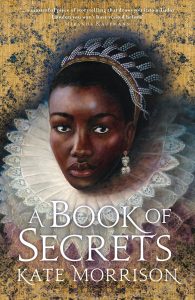 Published by Jacaranda 31 May 2019
Published by Jacaranda 31 May 2019
324pp, hardback, £16.99
Reviewed by Rachel Hore
In 1562, Baby Nsowah, her mother and elder brother, were stolen by slavers from their home in Guinea, West Africa. Her brother was sold and subsequently died, but Nsowah and her mother were taken to London where they were given to a gentry family. By the time the girl is three, however, she is orphaned. Renamed Susan, Nsowah is raised comfortably enough in the Sussex household of Sir Thomas Framfield to be companion and maid to his daughter Anne, and illegally catechized as a Catholic. The Book of Secrets is Susan’s first-person story. ‘That I am a Blackamoor is a book any man may read’, she says. Everything else about her has been ‘put into a cipher so perfect I often have trouble decoding it myself’.
When she’s eighteen disaster strikes the household. Susan survives a fever that kills Anne; this turns Anne’s grief-mad mother against her. Sir Thomas, meanwhile, receives notice that he’s to be imprisoned for harbouring priests. He hurriedly removes Susan from his wife’s way and sends her to London to marry a Catholic widower, John Charlewood. Though Charlewood proves a good husband he’s old, she does not love him, and the babies she bears him all die. It’s his handsome, but edgy apprentice, John Roberdine, who stirs her blood instead.
One of the many strengths of this novel is Susan’s tender sensibility as narrator. Intelligent and observant, loyal and brave, she’s the moral compass who guides us. Her life in London is dangerous. Morrison ably evokes the claustrophobic political atmosphere of the Elizabethan age. Charlewood is a successful printer who cheerily flouts the rules of the Stationers’ Guild, but also breaks much more serious laws by secretly printing recusant literature. Susan is taught to set type and read galleys to help her husband, but she also learns to dissemble and destroy evidence when their premises are raided by the authorities. All this is impressively detailed, though the research is worn lightly. In prose that wears a measured beauty Susan vividly conveys the period, using imagery and a world view that feels authentic for a genteel Catholic Englishwoman.
The author claims in her acknowledgements that her purpose in writing about Black Tudors is ‘to give the lie to those myth-makers who use a fantasy all-white English past to feed into far-right white supremacist narratives.’ Fortunately the fiction does not feel too freighted by this worthy aim. The portrait of Susan as a Black Englishwoman of the period feels to me both individualized and subtly wrought. She has the bearing of a gentlewoman and is largely treated as such. Her respectable marriage also protects her from any who might belittle her. She’s a masterly and believable fictional creation.
The ensuing narrative comprises two strands. One follows Susan’s efforts to save her husband after he is imprisoned for printing pro-Catholic literature. This aspect turns the novel into a thrilling and highly dangerous adventure. The other is more deeply personal, her heartfelt quest to explore her African origins. There are only a few pointers to her past. One involves tracing precisely what happened to her brother who, it turns out, might be alive after all. Then there are two curious small bronze objects that her mother left her: one, a figurine of a bird, the other a square block with a ladder marked in relief on the top. She puzzles over their meaning.
The Book of Secrets offers plenty of narrative twists and turns, and characters who prove other to what they seem. I don’t think it’s giving too much away to say that it ends in a fashion that is satisfying and feels true, but is not conventionally happy. Morrison tells us that her novel took fifteen years to write. Let’s hope we don’t have to wait so long for her next one!
